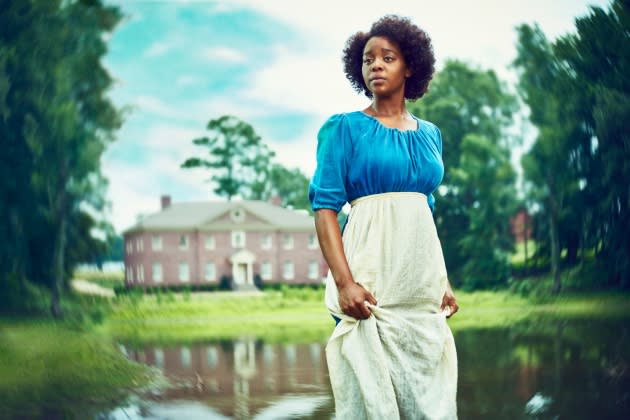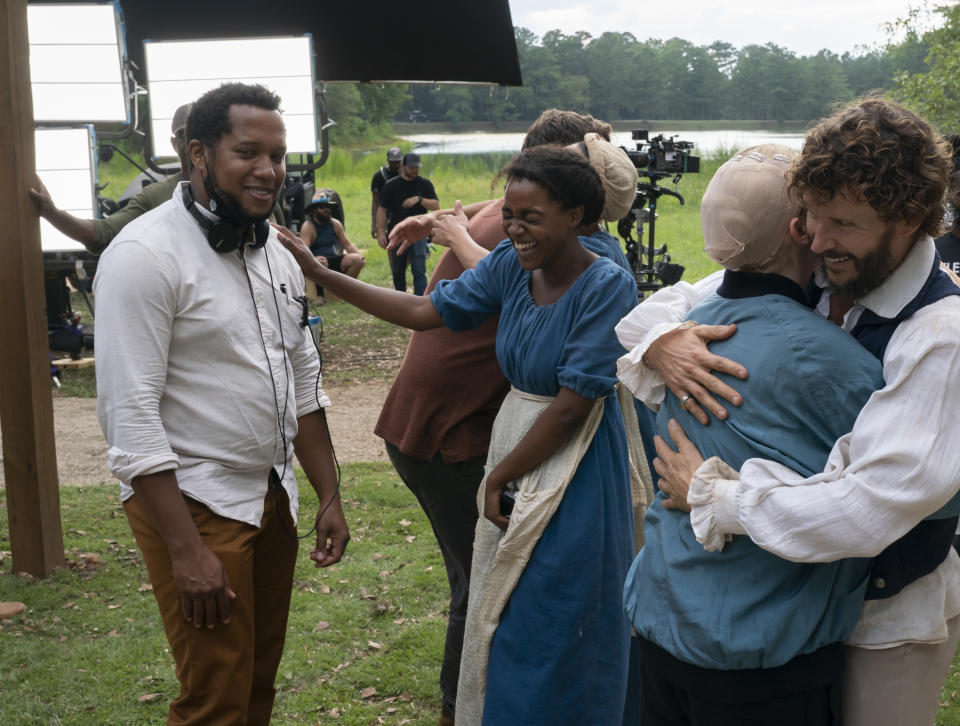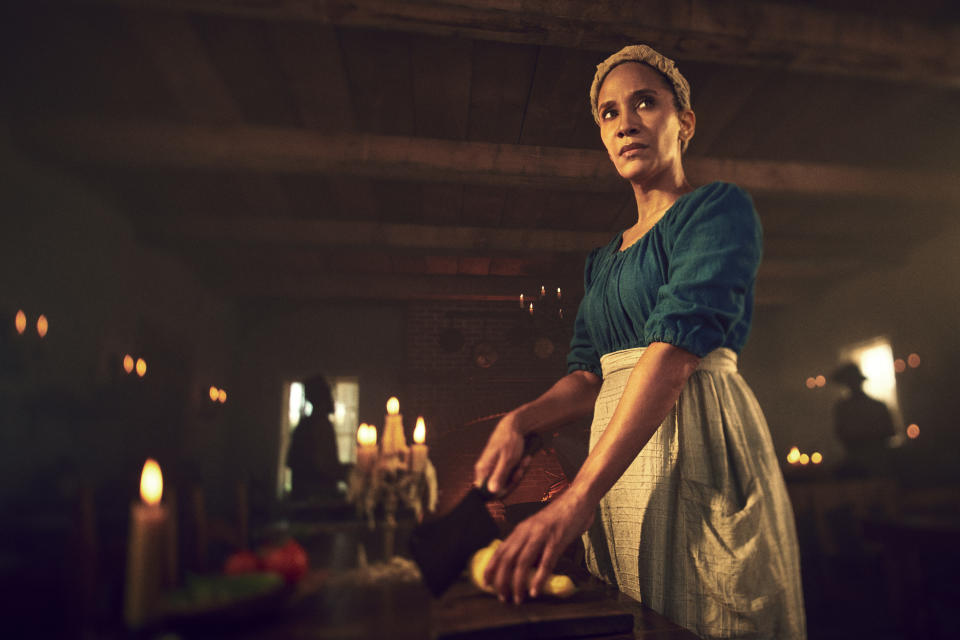‘Kindred’ Showrunner Branden Jacobs-Jenkins On The Process Of Adapting Octavia E. Butler For The Modern Age, Casting Newcomer Mallori Johnson, And Trying Not To “Aestheticize The Violence” Of Slavery Narratives
- Oops!Something went wrong.Please try again later.
- Oops!Something went wrong.Please try again later.

It’s been nearly five decades since the publication of Octavia E. Butler’s critically acclaimed Black sci-fi novel Kindred. In an interview with Publisher’s Weekly, Butler explained that she wanted to write a thought-provoking novel “that would make others feel the history: the pain and fear that Black people have had to live through in order to endure.” The themes of racial injustice, systematic oppression and trauma are, unfortunately, still an evergreen topic, but one that has always seemed primed for its own film or television series. We can see from the recent award-winning releases of HBO’s Lovecraft Country and Watchmen (2019) or writer-director Jordan Peele’s trilogy of films Get Out, Us and Nope that there’s an audience for adapting works that challenge, contextualize or expand the notions behind the complicated history of slavery and Black trauma in America.
It’s surprising that since its publication in 1979, Kindred has only ever been adapted into a graphic novel by Damien Duffy and artist John Jennings in 2017. Now in 2022, Hulu and FX’s Kindred, created by playwright Branden Jacobs-Jenkins, marks the first onscreen adaptation of Butler’s works. Aside from a couple of modern updates, such as changing the present-day time period of the novel to 2016 from 1976, the show’s overarching premise is similar to Butler’s book. Kindred follows Dana (Mallori Johnson), a 26-year-old Black woman who finds herself time traveling between her Los Angeles home and an Antebellum plantation in Maryland during the 1800s.
More from Deadline
Below, Jacobs-Jenkins discusses bringing Butler’s works onscreen, why Johnson was perfect to helm the series, and why audiences should challenge their notions of slavery.
DEADLINE: This is the first major adaptation of Octavia Butler’s work. But why do you think folks have been kind of hesitant to adapt her work?
BRANDEN JACOBS-JENKINS: I feel it has a lot to do with… well, I mean racism, first of all. But I think there was something about how I was pitching this going back to 2010, and I just could not get arrested–in a figurative sense– with this pitch. And the kind of feedback I just got was all about, “Who wants to see that? Who wants slavery?” It was just kind of a general energy of there’s no appetite for any of these stories about history in this way. I would say that in the meantime, a few key events sort of shook up Hollywood’s imagination in that way. One of them definitely being the runaway success of Get Out, which now, in retrospect, feels like inevitable. But at the time, I think people were kind of like, “What is this? These Key and Peele guys, he’s made this horror movie. What’s about to happen? What is social horror?” And I think suddenly; people were leaning forward when it came to anything having to do with race and genre.
And then Octavia Butler, in her lifetime, was always thought of as ahead of her time. And I’ve always felt like that time that she was ahead of is now here. And so that there seems to be, there’s no surprise that since 2016 she’s just mainstreamed so hard because she was doing this. She had this very intense, intellectual project that spanned decades that was ultimately about poking holes in the myths we have around race and superiority, and gender and the imagination. I started reading her when I was 13, and I think there was a whole wave of us who were reading her. Almost like she was a really well-kept secret. I feel like I really absorbed her into my DNA creatively, even beyond this project. Before I started doing this project, I think we’ve all just come to the age that we’re now cultural producers. And it’s an interesting phenomenon that she influenced so many people and inspired so many creatives, and we’re all just kind of saying her name out loud. And that’s part of it. Just like time’s passage, generations turning over and the sort of flowering of her influence is being born. It’s being witnessed in some way.
DEADLINE: Why was this story something you needed to tell right now?
JACOBS-JENKINS: I feel like I’ve been needing to tell this story or amplify this story or adapt this story for 12 years. So now just seems to be the time when the stars aligned, and the minds aligned enough to try to let me do it. I think that the themes are ultimately quite evergreen and sort of like the “quiet as it’s kept” quality of truth-telling. I feel like this is a story about the fact that, basically, the dirty secret of slavery is everyone was related. The family is not just the family you choose but the family that you didn’t choose. And how do you deal with the drama? That seems to be the kind of story that bubbles up to the surface for us as a country every generation. And I think that this is trying to work that all out in some detailed metaphor and experiential way.
And yeah, there’s a ton of, I mean, there’s fear in the sense that I feel an immense amount of pressure because I felt like… I have a pretty healthy career as a theatre artist and a professor outside of this life. And in those worlds, everyone knows that slavery has been the creative material of my life. I’ve written about it extensively. I teach it extensively. I think about it extensively, and I mythologize shit about it. But for whatever reason, I feel like this was the space that this story needed to live in somehow. And I felt immense pressure being as woke… that, I can’t even really articulate how intensely this book and Octavia, what they mean to me.

There were days when I would wake up, and I’m like, I don’t understand how I’m the person who’s doing this. But I guess it’s me. And at the same time, I am one of those super fans who, if this wasn’t me, I would be on this like a hawk. And so it’s tricky living with both of those things inside of me. But anytime I got nervous, I would just go back to the text. I would go, OK, what did she do? What happened in the book? What is she trying to say? And really just try to bend all of my creative energy into servicing her legacy and her and this book, trying to bring it into its next iteration because it’s really rich. And it’s amazing that it’s almost 45 years old. That’s insane to me.
DEADLINE: This series can be heartbreaking at times and harrowing for sure, but it never feels overtly traumatic. So how did you go about striking that balance?
JACOBS-JENKINS: Well, I mean, I’m someone who has a lot of opinions on the history of slavery as depicted in Hollywood, television and film. And this goes back to my academic life and all these things because I think there’s a real ethics to storytelling. And I guess I, really early on, had this kind of stake in the ground where I didn’t want to aestheticize the violence. I didn’t want to create any sort of energy around it that would allow you to remove yourself from the experience of the person suffering. So, I didn’t want you to be able to zoom back and go, “Ooh, that’s gorgeous.” You know? You needed to be there with that person who’s suffering. That is the point of telling a story like this, to me personally.
And I also felt like there is a real… I always say nothing’s done more harm to understanding slavery in America than film and television because it’s created these kinds of tropes and cliches and iconic images that your brain automatically goes to. When you hear slavery, you think of a white, neo-Greek revival plantation down an alley of oak trees and the cotton fields. Ironically enough, I sensed in the book that Octavia was very aware of that and wanted to break new ground for the imagination. She wanted us to [think differently]; she was writing against people who thought they understood the time [of slavery]. And she’s like, “No. I want to expand the way that we think about it, what we see when we think about it.”
For me, I felt like there’s a lot of amazing classics of the genre that do a very good job of leaning into incredibly traumatic set pieces and a certain kind of violence. But I wanted to really make space for the everyday violence of this system and what it was to be worn down over your whole life. And that kind of stuff is less sensational, ultimately. But it’s still as tragic and discomforting as you sit and think about it. So, I felt like right, on some level, people are coming to the show waiting for someone to be tied to a tree and whipped, you know what I mean? Or waiting for a certain kind of sexual assault. And I just wanted not necessarily to give into that so easily or something.
DEADLINE: How did you find Mallori Johnson? What qualities did she possess that proved she was the right choice for such a demanding role?
JACOBS-JENKINS: There was so much anxiety about [casting] Dana. We looked at a ton of actresses, many of whom were very familiar to TV audiences. And it was peak Covid, I had a two-month-old, and I was just up all night watching these self-tapes. And for whatever reason, her tape leapt out in me and in a way that I just kept going back to it because I knew that she was really young. I mean, she’s going to be mad if I tell you this story, but she had this weave in her hair. She has this crazy makeup on, yet somehow, her talent blasted through those issues [laughs]. We said to her, “OK, tie your hair back; don’t wear the makeup.” And, of course, she came in and just delivered. So, what it was is that she’s extraordinarily talented. She has a very… look; the [other] actors are great actors, I love [those] actors. But she has a very powerful sense of emotional access, which is the thing you’re looking for. I’m always interested in actors who are playing something behind the eyes, and she had it.
She just had that, and I’d never seen her before. I’d never heard of her before. I also felt that she embodied something I associate with Octavia Butler’s heroines, which is that they’re very individual. They feel like they’re very unique, and they’re very empathic, and they’re very intelligent and they’re kind of radically competent. And she just had that energy. No one else gave an audition like her. No one was giving the texture or the vibe of her. And it helped that she knew the book. Her mom is a novelist, and the more we talked, the more I was like, “Oh, you did your homework.” She was still in school, I think, at the time and was taking an on-camera class at Juilliard and on a whim, she had decided to audition. And I just find that so hilarious because it felt like she was giving an audition beyond her years. We all thought she was far older than she is. So, it’s one of those, to me, it’s one of those iconic like, “Oh, this is obviously a star’s story.” Which I never used to believe, but she just had it. And then, as you know, you kind of pass her up to the powers that be. They all had the same reaction, which is like, who is this person? And that’s what you want, I think, out of a lead like this for a role like this. I think she’s a big deal, and I feel very lucky that we got to get in on the ground floor.
DEADLINE: Let’s talk about some of these upgrades and differences from the book series. The story unfolds in 2016 and not in the 1970s like the novel. So, what kind of role did relevancy play in updating the story here?
JACOBS-JENKINS: Well, it was very intentional that we set [the show] in 2016. I had the estate’s blessing very early on with this, where I felt this strong impulse that it needed to feel contemporary. And Merrilee Heifetz, who was Butler’s agent and her literary executor, said to me, “Octavia would have understood that she needed to make it for now because that’s what she was doing. Right?” And I really took that to heart, and I was like, “Right.” [Octavia] didn’t know the future when she wrote this book in 1979. She was just trying to make a thing for her present tense. And she said [something similar] for her bicentennial commemoration. I felt like 2016 was a very clean 40 years later and had a similar kind of watershed moment energy to it. It’s the last year where I think everyone can kind of agree on what was happening. And also, to me, it really kind of held an almost nostalgic energy of it’s the last [lap for] Obama and everyone’s just feeling really healed and confident. So confident that a lot of people don’t vote. And it felt like everyone thought they knew everything about everything that had to do with Black and whiteness in America. And I thought that was the real opportunity to try to capture something about that innocence at the top of our season. Because, in some ways, the backsliding that’s literally happening to Dana, I think people were sort of feeling in an emotional or psychological sense in the ensuing years, maybe. And I thought that was an interesting opportunity. Also, I wanted to sort of see if things go well and we get renewed because people are so supportive and they watch the show; by the time the series ends, we would look back on that period as almost history itself. That was sort of an appealing shape to me as a writer to try to build towards.
And I also felt like though this book is in some ways this pioneering kind of almost Black feminist urtext; I wanted to honor the fact that it was pioneering and actually led to all kinds of interesting evolutions and iterations of these themes and ideas over the next almost half a century. And it felt important that it not feel like a museum piece or something that people could put out or remove because the whole entire concept of the book is a contemporary person with contemporary sensibilities is thrown into the past and forced to understand whether or not those contemporary ideas hold water in the real. I felt like when making this ‘70s period piece, people would feel very safe and ironically superior to Dana and Kevin, as opposed to thinking about the ways in which the evergreen heart, the energy of this story is still alive now.
DEADLINE: It’s also surprising that this show is planned as an ongoing series instead of a limited miniseries or a feature film, considering that it’s only one book. That cliffhanger is devastating.
JACOBS-JENKINS: Please don’t attack me in these streets [laughs]. I will say, the truth is, I think people are always like, “Why would you want Kindred to get adapted?” Kindred has been under option since 1979–since it was published. And I think the problem was that people were trying to make a movie out of it. And I think I was the first person to be like, “Guys, it’s a TV show.” Because the whole book is about the experience of being with people and watching these relationships and these human beings evolve over time. That’s what long-form television does.

I just felt like trying to squeeze that whole book into eight hours would’ve been nonsense. It would’ve been complete nonsense. There’s no way. Because even in the book, there’s months that passed, years that passed, and it’s like, really? Y’all want me to have some silly montage of her grinding corn to an Aretha Franklin song while we have 10 years pass? Or do you really want to feel the experience of what it was to be trapped in this kind of social death, this system? It’s about bringing people close to that feeling of being stuck and being trapped, though hopefully in an entertaining way. So, I feel like it needed more than eight episodes. I needed more than eight hours to really get into what this book really is trying to be about. People are just going to be mad at me, but it’s not the first time [laughs].
Kindred is streaming now on Hulu.
Best of Deadline
Sign up for Deadline's Newsletter. For the latest news, follow us on Facebook, Twitter, and Instagram.

